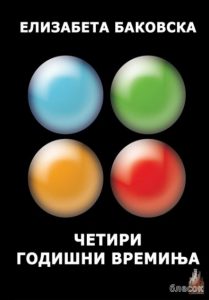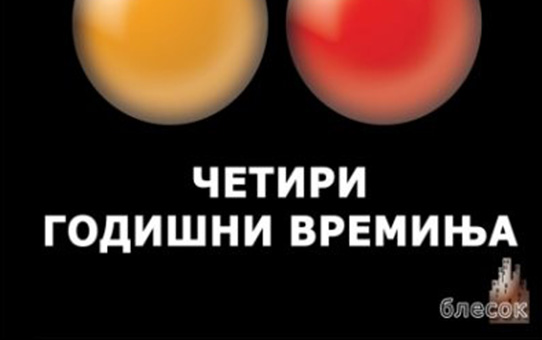
From the book “Four Seasons” by Elizabeta Bakovska.
The day was hot, and he had wandered around Butel graves with Robert for almost an hour. When he was coming this way, he somehow naively hoped that he would find his old friend still alive. He would be almost hundred, but people can live that long, can’t they? Some of them do, but the inscription of Vikor Aćimović’s grave, being the long-dried flowers, next to his name, read: 1915-1987. He was only a bit younger than his seventy-five when he left ad he could no longer tell him anything, nothing of the things that he had thought he wanted to tell him. He wanted to tell him thank you, he wanted to tell him that he had thought of him all of these fifty years, he wanted to tell him that those two weeks with him then in Skopje, had marked his life forever. But it was already late, he thought, tired and thirsty, and sat at the tomb with a sigh.
Frans, you remind me of my son, said Viktor when he saw him for the first time, on the hot August day in 1963. It took him three weeks to reach Skopje after he had heard about the earthquake. That’s it, he thought when he read about the disaster in the Dutch newspapers, that’s my story. Photography is nothing without emotion, his teacher at the time told him, and he started to seek the emotion that would help him make the photograph that would on its turn help him become a photographer. He was alone, his parents had died, no special woman waited for him at home, he had no permanent job, everything that he had was his new Nikon-F and a travel bag where he also packed a piece of carboard with “Skopje” written on it. He hitchhiked to Germany, and from Germany he took a train to Belgrade. In Belgrade, in some of the building of the then government, a frowning man in a dark suit listened to him without a word, and then he dictated something to his secretary and signed the piece of paper. His permit to go to the demolished Skopje, squeezed in between doctors, nurses, bandages and bottles with medicines, in the Jugoslav army Dakota.
Skopje did not even say welcome to him. Skopje was too busy with its agony to pay any attention to the young bearded foreigner. The insides of yesterday’s homes had spilled on the cobble road, shamelessly stripping the lives of their lost hosts. As he walked down the streets, he could see iron beds, walls with pastoral tapestries, clothes still hanging neatly on doors leading to nowhere in the rooms cut in half. Ghostly men wandered lost around the dusty streets – some of them walked purposelessly, others sat next to the ruins cleared by young soldiers, almost kids. The sun was burning cruelly, and the ruins smelled of carcasses, this filthy-sweet stench he knew from his childhood bombings. During one of these walks, he saw his first photograph – a woman with a gaunt face and two full bags, dressed in black, too warm for this heat, with a scarf on her head, sitting on a demolished wall, next to a coffin that could barely fit a one-year old child. Then he took a photo of the girl with two big bundles, standing next to the dried well, neatly combed and well dressed, waiting for somebody who was to take her to another, better place. He also photographed the people who slept on torn mattresses in the middle of the street. He also photographed the old man with a cigarette in his mouth sitting on a kitchen chair, in front of the tent of the Red Cross shelter.
Take it Frans, said Viktor, handing him two rolls of film. That’s all that I have, my friend, two for me and two for you. And he continued to take photos. He was forgetting to eat, he was forgetting to drink, he kept on wandering through human misery and took photographs. Sounds of dying echoed though the city – those buried under the rubble moaned from somewhere deep down, the beloved ones wept above the bodies of those who had gone quiet, the soldiers groaned in the heat, the thirsty children cried, the mothers sighed. And he didn’t utter a sound, he just kept taking photos. He didn’t know what was on the films, he didn’t know what would come out of them, because there was no place to develop them here. Take Frans, Viktor handed him bread and army beans in a metal dish, the safest thing to eat those days. When he was departing, they hugged each other, like a father and a son. Passing down the street for the last time, under the linen tree, all of a sudden, he saw himself. A child that had grown old before growing up, with blond hair and wild, suspicious eyes sat at the sidewalk, looking at him. He took out his Nikon hoping that there was still some film left. The camera snapped only once.
It took him fifty years to return to the city he no longer recognized, with photos that the city had not recognized for a long time. Fifty years since he had become a photographer, he returned to the emotion that created him. Sitting on his friend’s tomb, at the place where the silence chirps with the final sound of dying, he covered his face with his hands and cried.
Translated by the author.
